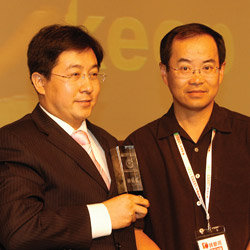
"This stroke center is looked up to for being very advanced in this arena," explained Dr. David Wang, medical director.
Dr. Huaguang Zheng, a stroke specialist who treats more than 70 patients daily as one of 100 neurologists at Tiantan (Temple of Heaven) Hospital in Beijing, was the first international visiting fellow through the Institute for U.S.-China Neuroscience & Stroke Initiative. He was selected for the three-month training scholarship from among many professionals from China vying for it last year.
Starting in February, the visiting fellow worked closely with the INI Stroke Center team of professionals, led by Dr. Wang, a founder of the U.S.-China Neuroscience & Stroke Initiative. This collaboration grew out of Dr. Wang's involvement with the annual Tiantan International Stroke Conference in Beijing. Through his connections within his field, he met an organizer of the conference, whom Dr. Wang describes as "the best interventionist in China," who invited him to attend the conference.
"With all the questions in my head and a little bit of skepticism, I took a trip to China," said Dr. Wang, who came away from the experience with a very different attitude. As a member of the Overseas Executive Committee, he now "helps them put the program together, conduct debates, share ideas and lecture."
Dr. Wang attended the ninth annual conference June 17th through 22nd, which attracted 5,000 healthcare professionals from throughout China. At that time, the second visiting fellow was selected through a rigorous application process. Starting next February, that individual will complete the three-month fellowship at either the INI Stroke Center or a center in Dallas affiliated with the U.S.-China Neuroscience & Stroke Initiative, which will expand to other institutions in the
United States in coming years, according to Dr. Wang.
The first visiting fellow, Dr. Zheng, said that he became interested in the fellowship after hearing Dr. Wang speak. "Dr. Wang has given several good lectures in my country," he said. At the end of his fellowship, he reported that he had "learned a lot from Dr. Wang," as well as other members of the INI Stroke Center team, knowledge which he has documented in an article he wrote for publication in his country. He hopes that he will be able to effect some changes at his hospital based on his experiences and observations during his fellowship.
During the three months he spent at INI Stroke Center at OSF Saint Francis, Dr. Zheng was especially impressed by the rapport between healthcare professionals and patients; the cleanliness of the clinical setting; the cooperation between different disciplines; and the fact that hospital rooms accommodate one or two patients, versus up to six at the 900-bed Tiantan Hospital in Beijing. Follow-up care offered to patients also stood out.
"Follow-up care is not enough in my country," Dr. Zheng said. "We have too many patients, for one thing, and doctors have too much to do and no time for follow-up. We need to set up a system for follow-up.
"I think that my being here as a visiting fellow is a starting point for a new start for our hospital. I think this will help us take some steps to improve the knowledge of stroke specialists in my country."
According to Dr. Zheng, his country is in the process of reforming its healthcare delivery system, and he said that he and his colleagues are looking forward to the outcome of that.
While the primary objective of the fellowship is to allow neuroscience professionals from China to gain experience at a world-class stroke center in the United States, the arrangement has proven to be mutually beneficial. During his time at INI Stroke Center, Dr. Zheng, a research manager for several multi-center stroke studies and editor of the Chinese Stroke Journal, gave a presentation on clinical research methods and statistics to the OSF Saint Francis professional medical staff. "Through this initiative, we can see how other centers deal with stroke," said Dr. Wang. "Visits like this benefit all parties concerned because the world is getting smaller." iBi

